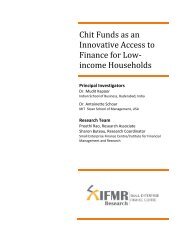Government of India Volume I: Analysis and Recommendations
Government of India Volume I: Analysis and Recommendations
Government of India Volume I: Analysis and Recommendations
Create successful ePaper yourself
Turn your PDF publications into a flip-book with our unique Google optimized e-Paper software.
ANNEXES<br />
10. All individuals, who may be individual agents or employees <strong>of</strong> corporate agents,<br />
brokers, advisers, banks <strong>and</strong> insurance companies, who are involved in the sale <strong>of</strong><br />
insurance services to consumers must be registered with the regulator. This registration<br />
process will be based on certain objective criteria, such as minimum qualifications,<br />
training <strong>and</strong> certification requirements, which will be prescribed by the<br />
regulator. The responsibility <strong>of</strong> verifying the individual’s compliance with the specified<br />
requirements should be left to the insurance company, in respect <strong>of</strong> its employees<br />
<strong>and</strong> agents. In case <strong>of</strong> independent advisors <strong>and</strong> brokers, who are not aligned<br />
with any particular insurer, the relevant service provider would be responsible for<br />
the registration <strong>of</strong> its employees.<br />
11. No minimum or maximum cap on commission or fee should be mentioned in the<br />
primary legislation. The law should allow the regulator to prescribe incentive structures<br />
for the sale <strong>of</strong> insurance services, keeping in view consumer interests.<br />
12. In case a policy lapses due to the non payment <strong>of</strong> premium, there should be an<br />
obligation placed on the insurer to issue a notice to the policyholder. However,<br />
these details need not be specified in the primary law. The primary law should<br />
only provide that the regulator may frame specific regulations for dealing with the<br />
lapsation on insurance policies, with a view to protecting policyholders.<br />
13. The scope <strong>of</strong> the present insurance ombudsman system needs to be exp<strong>and</strong>ed<br />
to allow complaints against insurance intermediaries, other than agents <strong>of</strong> the insurance<br />
company for whom the insurer will be directly liable. The ombudsman<br />
awards should be made enforceable against the complainant as well as the service<br />
provider, subject to the right to appeal before a specialised appellate forum.<br />
14. The law should specify the duty <strong>of</strong> parties to an insurance contract to act in good<br />
faith. It should also set out the meaning <strong>and</strong> consequences <strong>of</strong> insurance fraud.<br />
15. The collection <strong>and</strong> sharing <strong>of</strong> insurance information can help insurers make better<br />
pricing <strong>and</strong> underwriting decisions. It can also help insurers combat instances <strong>of</strong><br />
insurance fraud. The law should enable the sharing <strong>of</strong> insurance information while<br />
specifically providing the data protection <strong>and</strong> confidentiality requirements applicable<br />
to any person, including the regulator, that holds information belonging to<br />
others.<br />
16. The primary legislation must empower the regulator to act in a manner that promotes<br />
better access to micro insurance. This should be done by stating that ‘promoting<br />
innovation <strong>and</strong> access to insurance services’ is one <strong>of</strong> the key principles to<br />
be followed by the regulator.<br />
17. There is a need for reforms in the heath care sector to provide for the codification<br />
<strong>of</strong> ailments, procedures <strong>and</strong> protocols followed by health providers. This will help<br />
in promoting better underwriting by insurance companies by reducing the moral<br />
hazard problems in the supply <strong>of</strong> health care services to insured persons.<br />
18. Motor insurance:<br />
(a) In order to minimise inconvenience <strong>and</strong> costs, the law should provide the accident<br />
victim, insurer <strong>and</strong> insured an opportunity to arrive at a voluntary settlement<br />
<strong>of</strong> the claim without having to go through the adjudication process. If<br />
the parties fail to arrive at a settlement, the compensation should be decided<br />
on a fast track basis by a specialised tribunal.<br />
(b) The law should lay down the minimum amount <strong>of</strong> insurance coverage that<br />
must be obtained by every vehicle owner. This will ensure that accident victims<br />
are assured <strong>of</strong> receiving compensation <strong>of</strong> up to the insured amount. It<br />
will also provide insurers with more certainty on their potential liabilities. In<br />
order to achieve this, the regulator will have to discontinue the practice <strong>of</strong> fixing<br />
the premium for third party motor insurance policies.<br />
168 FINANCIAL SECTOR LEGISLATIVE REFORMS COMMISSION



